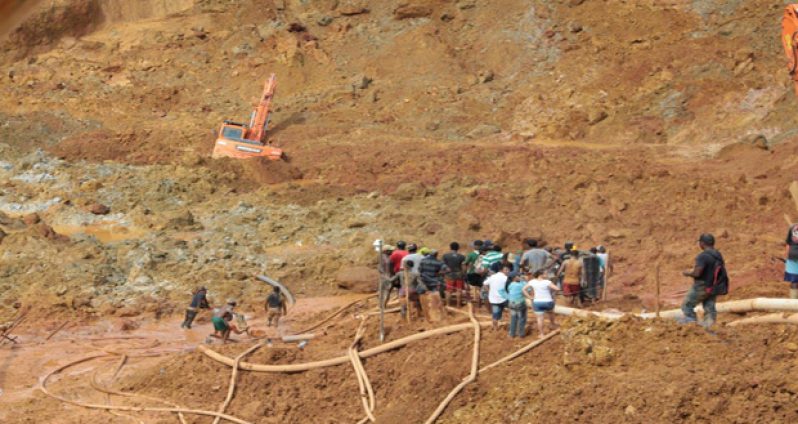THE “work and collect money” culture prevalent at small and medium-sized gold and diamond mining operations leads to fatal accidents, the body representing the miners has said, as government looks to halt dangerous practices.
“It is a culture,” said Collin Sparman of the Guyana Gold and Diamond Miners Association (GGDMA), referring to the common practice of dredge owners just hiring a general manager who then push the workers to get the gold, unmindful of safe practices. In the end, it is the very workers who are pushed to produce at all costs who end up losing their lives.
Sparman, the administrative manager of the GGDMA, said that the culture of “work and collect money” must be broken and that dredge owners need to value the lives of their employees and put in place practices to ensure safety.
Some 25 persons have died in 16 accidents from June 2014 to June 2015, with 18 of them dying as a direct result of pits collapsing.
The government is currently studying the recommendations of a Commission of Inquiry (CoI) into recent fatal mining accidents. The minister who oversees the natural resources sector, Raphael Trotman, told the Guyana Chronicle on Saturday that his ministry is “deeply concerned” about the number of fatalities in the mining industry.
“Government is concerned about miners’ safety. We want to have safety improved, so we are working with all stakeholders on how to improve safety in the mines,” he said.
Trotman is likely to meet with stakeholders in the industry tomorrow.
The preliminary report from the Commission of Inquiry (CoI) into the deadly mining pit collapses over the past few months pointed to several deficiencies, including negligence, unsafe mining practices, lack of proper ingress and egress, lack of sufficient training, and inadequate search-and- rescue recovery systems.
Sparman, quoted earlier, called on miners to own up to their responsibilities.
“Miners, dredge operators, general managers, owners – they all need to take responsibility,” Sparman told the Guyana Chronicle.
He noted that while it is the role of the regulator –the Guyana Geology and Mines Commission (GGMC) – to ensure that all mining regulations are followed, that entity does not have “sufficient resources to function.”
“There are thousands of mining operations…and about 60 mines officers.
“It is difficult for the mining officers to be there at the same time and all the time. By the time their backs are turned, the miners continue to breach the regulations.”
Sparman believes that miners have an “all-about-the-hustle” mentality that needs to be curbed urgently. “We need to get rid of that mentality, and fast,” he said “or it could prove catastrophic.”
The GGDMA administrative officer said of all the findings, what he believes to be a major issue is the engineering of the mining pits. He noted that the walls of many of the pits are too high. Some are as high as 60 feet, he said, pointing to the need for mining operators to have their pits benched. Benching, he said, can release some of the stress as the heights of many of the mining pits are the major cause of pit collapses.
“Mining operators must have their pits properly controlled. This is critical. We found that steep and high pits with poor or no benches were a feature of these [accidents].” He added that many of the mining walls were breached, and in those situations, wet soil cannot be restrained.
“Benches are like steps. They help prevent the walls from falling, thereby reducing pit collapses,” he told Guyana Chronicle.
Sparman noted too the absence of proper ingress and egress points to the mines, which makes it increasingly impossible for miners to escape danger.
He noted that three operations in the Cuyuni area were recently ordered to stop working and they were ordered to correct the situation as the walls of the mining pits were too high, posing danger to workers.
“Miners are living in fear for their lives. They fear walls falling on them and that must be an uncomfortable situation. I can imagine what transpires during the radio station.”
The negligence in digging pits, Sparman noted, must be curbed quickly. He said too that miners should suspend operations for a few hours daily during the rainy season to prevent mining pits from collapsing.
On Friday, Sparman revealed some aspects of the CoI report that is to be discussed with government on Monday.
Recommendations of CoI
Many recommendations were put forward by the CoI and among them is the need for mining operators to be given robust guidelines to carry out their activities. Accordingly, engineering support has been deemed mandatory to ensure safety of miners.
Also, the commission has recommended that operators who use heavy-duty equipment file a plan with the relevant authorities as it is not enough for operators to dig pits without clear directions. On the issue of the regulatory body – the GGMC – the commission called on the GGMC to fulfil its mandate. The report noted that visiting mining operations and issuing of cease orders were not sufficient to curb bad practices.
The inexperience of those working in the industry is a major problem and as such, the CoI report noted the need for there to be adequate training of those in the mining industry.
“Workers need to be trained in first- response and first aid and other recovery protocols. There is clear evidence of poor reporting. There are many mining officers who are in the districts but don’t know what’s happening,” Sparman said.
President David Granger had ordered an inquiry in mining accidents after 10 miners were killed when a pit collapsed in May this year. The inquiry was carried out by Dr. Grantley Waldron, Jo Bayah and Sparman.
By Ariana Gordon
Mining accidents… ‘Work and collect money’ culture costing lives
SHARE THIS ARTICLE :
Facebook
Twitter
WhatsApp



.jpg)









